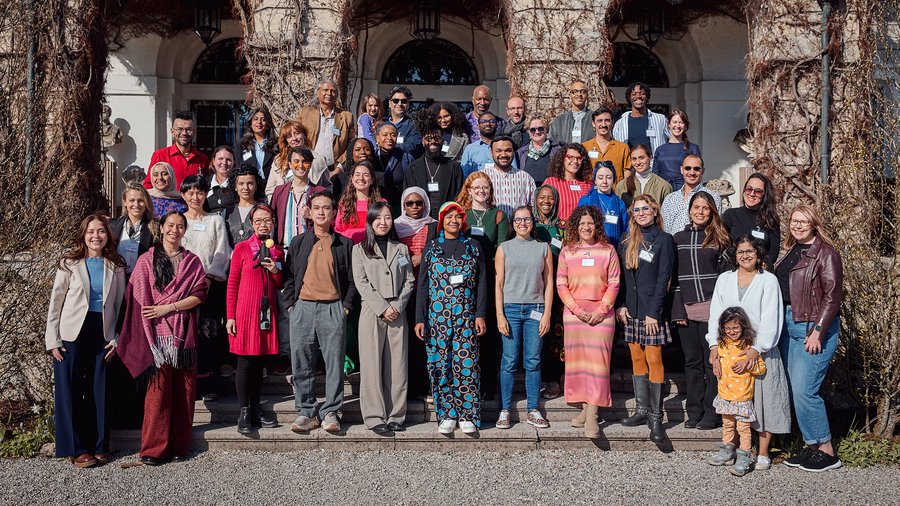More than 40 artists, writers, filmmakers, journalists, and community practitioners gathered at Schloss Leopoldskron to explore how storytelling can forge more inclusive and connected futures
Narrative is the foundation of understanding, intricately weaving together the threads of belief, culture, and identity that define the world. Throughout history, dominant narratives have been powerful catalysts for significant social transformation. When intentionally reshaped, these narratives possess the potential to dismantle prejudice, ignite collective imagination, and bridge divides that might otherwise separate communities.
In today’s climate of increasing polarization and declining trust in institutions, the role of artists and cultural workers has never been more important. From oral traditions and protest songs to viral campaigns and immersive installations, storytelling continues to evolve alongside shifting social and technological landscapes. In this fragmented and misinformation-driven world, artists are no longer just observers, they are active agents reshaping cultural narratives. Through film, literature, visual art, and performance, artists bring nuance to public discourse, elevate marginalized voices, and challenge the stories upheld by dominant power structures.
One sees this in the Chilean theater collectives who courageously restage testimonies from the dictatorship era to confront the enduring legacies of authoritarianism; in the Dalit poets of India who reclaim their language as an act of resistance against the oppressive caste system; and in the Palestinian musicians who preserve cultural identity under repression by seamlessly blending traditional melodies with contemporary forms. These diverse interventions underscore a fundamental truth: art transcends mere aesthetic appeal, and it is a strategic and powerful act of truth-telling.
But these efforts also prompt deeper questions: What does creative resistance look like in a world increasingly split between physical and digital realms? How does one redefine authorship in the age of AI? And how can narratives become tools for healing rather than division? These questions animated this year’s "Creating Futures: Art of Narrative" session, held at Salzburg Global from April 6 to 11, 2025. Over five days, more than 40 artists, writers, filmmakers, journalists, and community practitioners from across the globe gathered at Schloss Leopoldskron to explore how storytelling can forge more inclusive and connected futures, particularly in our hybrid world.
This year’s session welcomed nine returning Salzburg Global Fellows and two former interns, whose ongoing commitment fostered continuity, trust, and a shared vision within the Salzburg Global community. Alongside them, 34 new Fellows arrived with fresh perspectives and a desire to contribute their work to a global conversation. Together, this diverse group exchanged ideas, shared experiences, and built meaningful connections, collectively shaping a more informed and inclusive future.
The session's opening day provided a framework by mapping the intricate landscape of the global information disorder and delving into the enduring ways in which colonial legacies continue to shape whose stories are amplified and whose remain unheard. Chinese artist Binghuang Xu’s thought-provoking short film, which powerfully exposed the subtle yet pervasive reproduction of gendered silences within mainstream culture, effectively set the tone for a profound conversation centered on the act of personal storytelling as a potent form of resistance against dominant narratives.
A central and compelling theme that wove its way through the program was the critical exploration of how disinformation and the increasing polarization of societies disproportionately impact marginalized communities, and the indispensable role that artists can and must play in actively countering these detrimental forces. South African artist and storyteller Bianca Van Rooi expanded this conversation by examining how digital platform algorithms, often hidden from view, actively amplify anti-gender disinformation. She discussed the power of local storytelling, combined with strategic digital media and creative expression, can restore nuance to complex issues and help rebuild trust, both within communities and across broader media ecosystems.
By mid-week, the conversations also dedicated significant attention to the crucial responsibilities of institutions in shaping narratives. This included illuminating examples of museums that are actively embracing collaborative practices by co-curating exhibitions with Indigenous groups, ensuring that voices and perspectives are authentically represented. Furthermore, the discussions shone a spotlight on the profound impact of platform algorithms and the very formation of individual and collective identities. Indian artist Gaurav Singh shed light on how biased training data in AI systems can unintentionally distort or erase the cultural complexity embedded in personal and collective narratives.
The session also surfaced pressing conversations about the risks artists face in politically repressive contexts. Egyptian artist and choreographer Hazem Header described how surveillance, arrests, and funding restrictions in Egypt have made artistic expression a form of resistance. While Palestinian visual artist Yasmine Omari highlighted the systems of identification and control that limit movement and silence voices. These reflections made clear that in such environments, art is not just storytelling; it becomes a mean of survival.
On the final day, discussions evolved into concrete visions for the future. What began as a theory took shape through working groups focused on shared passions. Groups developed prototypes for audience engagement about information verification, a book spotlighting censored artists and writers, and a website showcasing global artistic expression. These conversations extended beyond the walls of Fellows Hall. Whether during lakeside walks, shared meals in the Marble Hall, or impromptu creative sessions, participants lived, shared, and honored the power of narrative and storytelling.
As the session came to a close, Fellows left with fresh ideas, deeper perspectives, and a strengthened network, ready to return to their communities as empowered catalysts for creative change. Throughout the week, the belief in the transformative power of stories was reaffirmed. In the inspiring setting of Schloss Leopoldskron, a global community of artists and storytellers began shaping the next chapter of shared human experience.
Learn more about the "Creating Futures: Art of Narrative" session, which occurred from April 6 to 11, 2025 as part of the Culture, Arts and Society program.


